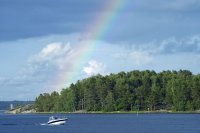Meeting with members of the European Parliament’s Fisheries Committee

Commissioner Damanaki met today with members of the European Parliament’s Fisheries Committee. Commissioner welcomed the Committee’s vote earlier today supporting the conclusion of the Protocol to the EU-Morocco Fisheries Partnership Agreement, informed the Committee of the Commission’s priorities for the next semester and exchanged views with members of the Committee on the management of herring and mackerel stocks in the North-East Atlantic.

Commissioner's statement during the PECH Committtee
Chair, Honourable Members,
I would like to thank the Committee for inviting me today. Exchanging views with you on fisheries issues is always top priority for me and therefore I am very happy to be here today. I understand that many of you are interested in the state of play on herring and mackerel in the North-East Atlantic. Let me though inform you on our priorities for next semester:
1. Finalizing the reform for implementation on the new fisheries policy. DG MARE is working on details for the discard ban, the regionalization, the labelling, etc.
2. Just a brief word on the ongoing trialogues on the EMFF. I would like to thank the chair, Mr Mato, and the rapporteur, Mr Cadec, for the very constructive and effective running of the trialogues. Positions are very close on the majority of the key issues and I urge you and Council to reach political agreement before the end of the year. I am confident that, with the necessary flexibility from all institutions, this can be done.
3. Having all this in place, we are going to focus on control and compliance issues in our Member states but also worldwide. The implementation of IUU Regulation is important. Last year we warned eight countries that they may end up on a list of non-cooperating countries, if they did not start cooperating with us in fighting against IUU fishing. After a year of careful investigation and close follow-up, we have concluded that 5 countries have made credible progress. These countries are Fiji, Panama, Sri Lanka, Togo and Vanuatu. For three other countries, namely Belize, Cambodia and Guinea, progress has not been satisfactory and therefore the Commission decided yesterday to identify these countries as non-cooperating. We have also adopted a proposal to the Council to place these countries on a final black list. Once adopted, fisheries products caught by these countries' vessels will be fully banned from import into the EU. On the same day, we adopted pre-identification decisions for three new countries: Korea, Ghana and Curacao. We will take the same steps here as we did for the eight countries last year: formally notifying the decision, opening a dialogue and proposing an action plan.
4. Sustainable management of fisheries is the main pillar of our work outside the EU. So fighting IUU indeed, but also reducing overcapacity, and strengthening the performance of RFMOs. (Success in ICCAT meeting.) As regards overcapacity, I would like to inform you of a conference I will be organising with the Greek Presidency in Thessaloniki next March to move forward international cooperation.
5. On Morocco, I take note of your decision earlier today. I am convinced that this agreement has been fundamentally improved compared to the previous one, thanks to your input. It is economically, ecologically and socially viable, as well as fully compliant with international law. I am therefore looking forward to Parliament's consent to this agreement during the next plenary in December.
6. Let me now come to the management of herring and mackerel stocks in the North-East Atlantic.
On herring, you will remember that the Commission adopted measures against the Faroe Islands. These include: A prohibition to import into the EU herring or mackerel caught under the control of the Faroe Islands, and a prohibition to use EU ports by vessels having participated in the fisheries under the control of the Faroe Islands or transporting such fish. These prohibitions are being enforced by Member States' port and border authorities. I believe they constitute an important deterrent for the Faroe Islands to continue their unsustainable herring fishery. You also know that the Faroe Islands have initiated two processes under the dispute settlement procedures of UNCLOS and the WTO. Under UNCLOS, at present there is agreement of principle on the members of the Arbitral Tribunal and on a number of procedural issues. Under WTO we are still at the preliminary steps of the consultation requested by Faroe Islands. Let me emphasize that these processes have no direct impact on our trade measures: they will continue to apply until the Faroe Islands adopt more sustainable fishing levels of herring.
Relating to mackerel:
An agreement between the Coastal States now is highly desirable both for the long term sustainability of the stock, and for the long term socio economic interest of the fishing and processing sectors. We must get rid of the Olympic style fisheries on this valuable stock. There is substantial overfishing now, it has to be substantially reduced.
A window of opportunity has been opened with the latest ICES scientific advice, which recommends a TAC level of 889,000 t for 2014. You will recall it was 542,000 t in 2013.
This stock size means that in all scenarios we are studying, there will be increased fishing possibilities for our fishermen in the Union and in Norway. There is a real possibility for Iceland and the Faroes to reduce their previous unrealistic requests in terms of share of the stock they claim.
Since the summer, we have been working hard to move towards a deal. We haven't reached that stage yet, but there are encouraging signs.
What I can tell you is that we have reached an understanding with Iceland on a quota share and we are talking to the Faroe Islands.
Norway is a key partner to the EU. They are not yet convinced – they are still reflecting. You shouldn't find this surprising, since a new Government has only been in office for the last month or so.
My appreciation is that there are ample fishing opportunities now available to make a deal – to bring sustainable fisheries back to this stock. This is what almost all the Member States in the Council think as well. The worst scenario of all would be to fail to get an agreement due to the stubbornness and short term interest of one or other party. This condemns us to the continuation of fishing well beyond the ICES advice through the adoption of unilateral quotas. The worst agreement is no agreement now.
These actions show that the Commission is able and willing to use the powers it was granted to ensure sustainable fishing outside the EU whenever the legal conditions are fulfilled.
Thank you.


 Reform of the Common Fisheries Policy
Reform of the Common Fisheries Policy Blue Growth: marine and maritime sustainable growth for Europe
Blue Growth: marine and maritime sustainable growth for Europe